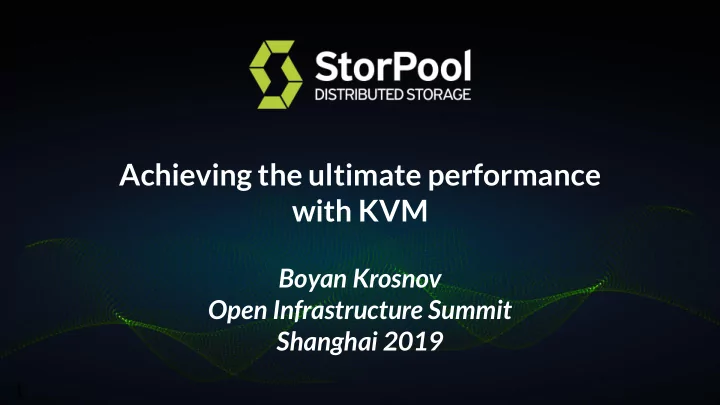

Achieving the ultimate performance with KVM Boyan Krosnov Open Infrastructure Summit Shanghai 2019 1
StorPool & Boyan K. ● NVMe software-defined storage for VMs and containers ● Scale-out, HA, API-controlled ● Since 2011, in commercial production use since 2013 ● Based in Sofia, Bulgaria ● Mostly virtual disks for KVM ● … and bare metal Linux hosts ● Also used with VMWare, Hyper-V, XenServer ● Integrations into OpenStack/Cinder, Kubernetes Persistent Volumes , CloudStack, OpenNebula, OnApp 2
Why performance ● Better application performance -- e.g. time to load a page, time to rebuild, time to execute specific query ● Happier customers (in cloud / multi-tenant environments) ● ROI, TCO - Lower cost per delivered resource (per VM) through higher density 3
Why performance 4
Agenda ● Hardware ● Compute - CPU & Memory ● Networking ● Storage 5
Compute node hardware Usual optimization goal - lowest cost per delivered resource - fixed performance target - calculate all costs - power, cooling, space, server, network, support/maintenance Example: cost per VM with 4x dedicated 3 GHz cores and 16 GB RAM Unusual - Best single-thread performance I can get at any cost - 5 GHz cores, yummy :) 6
Compute node hardware 7
Compute node hardware Intel lowest cost per core: - Xeon Gold 6222V - 20 cores @ 2.4 GHz lowest cost per 3GHz+ core: - Xeon Gold 6210U - 20 cores @ 3.2 GHz - Xeon Gold 6240 - 18 cores @ 3.3 GHz - Xeon Gold 6248 - 20 cores @ 3.2 GHz AMD - EPYC 7702P - 64 cores @ 2.0/3.35 GHz - lowest cost per core - EPYC 7402P - 24 cores / 1S - low density - EPYC 7742 - 64 cores @ 2.2/3.4GHz x 2S - max density 8
Compute node hardware Form factor from to 9
Compute node hardware ● firmware versions and BIOS settings ● Understand power management -- esp. C-states, P-states, HWP and “bias” ○ Different on AMD EPYC: "power-deterministic", "performance-deterministic" ● Think of rack level optimization - how do we get the lowest total cost per delivered resource? 10
Agenda ● Hardware ● Compute - CPU & Memory ● Networking ● Storage 11
Tuning KVM RHEL7 Virtualization_Tuning_and_Optimization_Guide link https://pve.proxmox.com/wiki/Performance_Tweaks https://events.static.linuxfound.org/sites/events/files/slides/CloudOpen2013_Khoa_Huynh_v3.pdf http://www.linux-kvm.org/images/f/f9/2012-forum-virtio-blk-performance-improvement.pdf http://www.slideshare.net/janghoonsim/kvm-performance-optimization-for-ubuntu … but don’t trust everything you read. Perform your own benchmarking! 12
CPU and Memory Recent Linux kernel, KVM and QEMU … but beware of the bleeding edge E.g. qemu-kvm-ev from RHEV (repackaged by CentOS) tuned-adm virtual-host tuned-adm virtual-guest 13
CPU Typical ● (heavy) oversubscription, because VMs are mostly idling ● HT ● NUMA ● route IRQs of network and storage adapters to a core on the NUMA node they are on Unusual ● CPU Pinning 14
Understanding oversubscription and congestion Linux scheduler statistics: linux-stable/Documentation/scheduler/sched-stats.txt Next three are statistics describing scheduling latency: 7) sum of all time spent running by tasks on this processor (in jiffies) 8) sum of all time spent waiting to run by tasks on this processor (in jiffies) 9) # of timeslices run on this cpu 20% CPU load with large wait time (bursty congestion) is possible 100% CPU load with no wait time, also possible Measure CPU congestion! 15
Understanding oversubscription and congestion 16
Discussion 17
Memory Typical ● Dedicated RAM ● huge pages, THP ● NUMA ● use local-node memory if you can Unusual ● Oversubscribed RAM ● balloon ● KSM (RAM dedup) 18
Discussion 19
Agenda ● Hardware ● Compute - CPU & Memory ● Networking ● Storage 20
Networking Virtualized networking Use virtio-net driver regular virtio vs vhost_net Linux Bridge vs OVS in-kernel vs OVS-DPDK Pass-through networking SR-IOV (PCIe pass-through) 21
Networking - virtio VM User space Kernel Qemu Kernel 22
Networking - vhost VM User space Kernel Qemu vhost Kernel 23
Networking - vhost-user VM User space Kernel vhost Qemu Kernel 24
Networking - PCI Passthrough and SR-IOV ● Direct exclusive access to the Host VM VM VM PCI device Host driver driver driver ● SR-IOV - one physical device driver appears as multiple virtual Hypervisor / VMM functions (VF) ● Allows different VMs to share a IOMMU / VT-d single PCIe hardware PCIe PF VF1 VF2 VF3 NIC 25
Discussion 26
Agenda ● Hardware ● Compute - CPU & Memory ● Networking ● Storage 27
Storage - virtualization Virtualized cache=none -- direct IO, bypass host buffer cache io=native -- use Linux Native AIO, not POSIX AIO (threads) virtio-blk vs virtio-scsi virtio-scsi multiqueue iothread vs. Full bypass SR-IOV for NVMe devices 28
Storage - vhost Virtualized with host kernel bypass vhost before: guest kernel -> host kernel -> qemu -> host kernel -> storage system after: guest kernel -> storage system 29
NVMe SSD storpool_server instance 1 CPU thread 2-4 GB RAM NVMe SSD NVMe SSD storpool_server instance 1 CPU thread 25GbE . . . 2-4 GB RAM NVMe SSD NIC 25GbE NVMe SSD storpool_server instance 1 CPU thread 2-4 GB RAM NVMe SSD KVM Virtual Machine storpool_block instance 1 CPU thread KVM Virtual Machine • Highly scalable and efficient architecture • Scales up in each storage node & out with multiple nodes 30
Storage benchmarks Beware: lots of snake oil out there! ● performance numbers from hardware configurations totally unlike what you’d use in production ● synthetic tests with high iodepth - 10 nodes, 10 workloads * iodepth 256 each. (because why not) ● testing with ramdisk backend ● synthetic workloads don't approximate real world (example) 31
ops per second best service Latency 32
lowest cost per delivered resource ops per second best service Latency 33
only pain lowest cost per delivered resource ops per second best service Latency 34
benchmarks only pain lowest cost per delivered resource ops per second best service Latency 35
example1: 90 TB NVMe system - 22 IOPS per GB capacity example2: 116 TB NVMe system - 48 IOPS per GB capacity 36
? 37
Real load 38
? 39
Discussion 40
Thank you! Boyan Krosnov bk@storpool.com @bkrosnov www.storpool.com @storpool 41
Recommend
More recommend